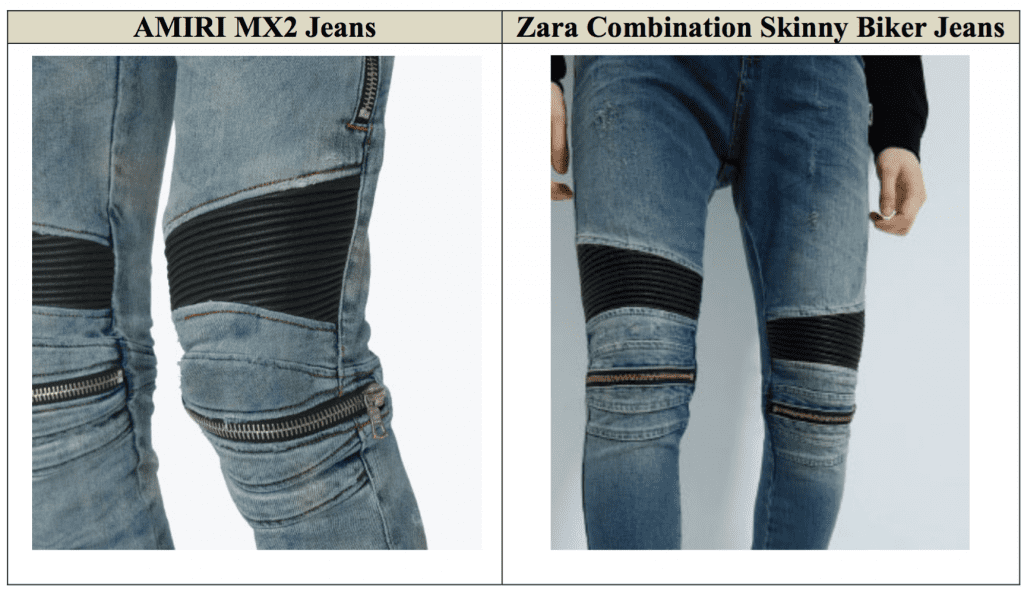Amiri “does not own any protectable trade dress rights” in a $1,150-plus style of jeans, Zara argues in its recently-field response to the lawsuit that the burgeoning Los Angeles-based brand filed against it early this year. Despite the federal trade dress infringement and unfair competition claims that Amiri makes in connection with the $3 million lawsuit that it filed against “serial infringer” Zara in a federal court in California in January, Zara claims that Amiri lacks the necessary rights in the alleged trade dress at issue, as the design of its MX2 jeans is not protectable.
In the answer that counsel for Zara filed with the U.S. District Court for the Central District of California late last month, the Spanish fast fashion giant admits that it began selling its $50 “Combination Skinny Jeans … in or about December 2019,” a style that Amiri claims has “the same distinctive pleated leather panel detailing, side zippered thigh pockets, zippered knee closures, and skinny fit washed denim” as its celebrity-favored MX2 jeans. But even if it did offer them up to consumers in its brick-and-mortar stores across the globe and on its e-commerce site, Zara denies that it is legally in the wrong for doing so.
Despite the lookalike nature of the parties’ pants, “Zara never approached [Amiri] for a license to use its trade dress or other of [its] intellectual property rights,” the brand claims, and instead, Zara “blatantly, willfully, and [with] conscious disregard for [Amiri’s] rights … has taken to capitalizing on the goodwill, recognition and fame associated with the Amiri MX2 jeans.”
By selling “its own lower-quality, knock-off Combination Skinny Biker jeans” in which “virtually every discernible aspect … is intended to emulate the AMIRI MX2 jeans,” Amiri claims that Zara has infringed its trade dress rights in the configuration of “stretch denim, pleated leather panel detailing, zippered outside thigh pockets, zipper closures at the knee-line, and hand-distressed abrasions throughout.” To this, and to Amiri’s claim that it maintains protectable trade dress in the MX2 design because it is “distinctive and instantly recognizable” as coming from the Amiri brand (in much the same way as a brand’s trademark-protected name or logo), Zara essentially says, not so fast.

To be exact, Zara asserts – as one of nine affirmative defenses – that Amiri does not have “any protectable trade dress rights [in the jeans design] given that [its] trade dress rights are invalid.” In order for trademark or trade dress rights to exist (trade dress is a subset of trademark law that provides protection for the overall image of a product, such as the color, shape, size, and/or configuration, as long as the design has the same source-identifying function as a traditional trademark, such as a logo or word mark), the mark or configuration at issue must be distinctive (and thus, not generic) and non-functional. According to Zara, Amiri’s jeans do not meet either of those requirements, as the design “qualifies, without limitation, as functional, generic, ornamental, and/or not distinctive.”
Even if Amiri does maintain trade dress rights and those rights were infringed by way of its Combination Skinny Biker jeans, Zara claims that it “acted in good faith and without any intent to infringe [Amiri’s] purported rights.”
More than that, Zara further argues that Amiri’s claims are barred by the (alleged) fact that while it asserts that it suffered damages “believed to be in excess of $3,000,000,” the brand did not actually suffer any damages as a result of Zara’s alleged infringement (i.e., its sale of inexpensive, lookalike jeans). The fast fashion giant also asserts that it is shielded from infringement liability in connection with its use of the design at issue amounts to fair use, a defense to copyright and trademark infringement.
As for whether there is any merit to Zara’s claims, its assertion that Amiri’s purported trade dress lacks distinctiveness is an interesting one. While AMIRI’s MX2 pants have certainly been the subject of a fair share of unsolicited (i.e., not directly paid-for) media attention thanks to their adoption by celebrities, which bodes well from a secondary meaning perspective, it would be interesting to see whether AMIRI would actually be able to show that consumers link the trade dress at issue to a single source given that other, bigger brands, namely, Saint Laurent (under the direction of Hedi Slimane) and Balmain (in its halcyon Christophe Decarnin days), have showed similar style pants before the release of the MX2’s).
*The case is Atelier Luxury Group LLC v. Zara USA, Inc., 2:20-cv-00675 (C.D.Cal.).













